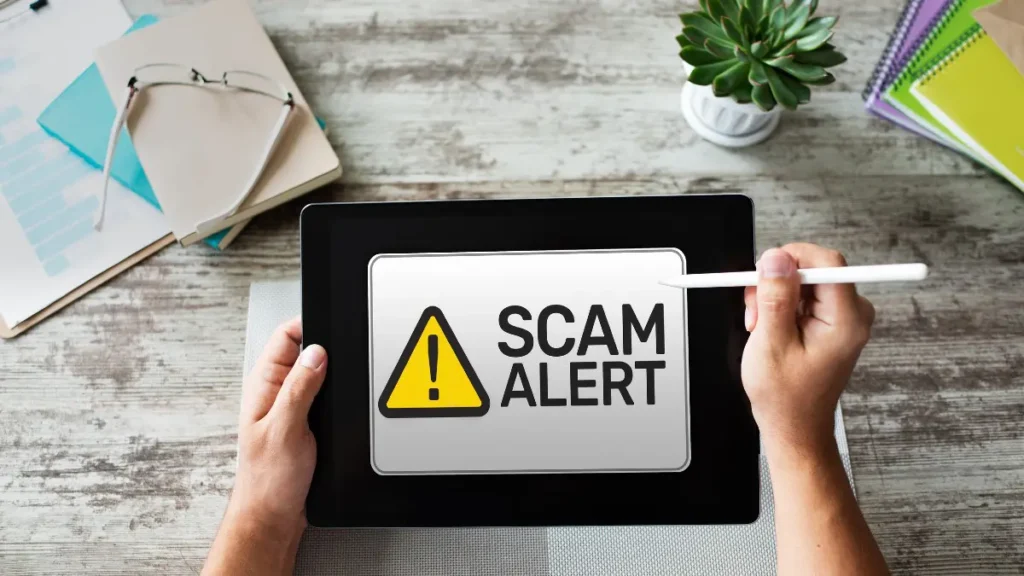Foreclosure rescue scams can be devastating to homeowners who are already struggling to keep their homes. These scams are perpetrated by individuals or companies who claim they can save your home from foreclosure with the promise of lower payments or a modified loan. Unfortunately, these scammers often take homeowners’ money and disappear, leaving them in an even worse financial predicament. To prevent this from happening, Home Title Lock shares some helpful tips on identifying a foreclosure rescue scam.
Page Contents
Why People Facing Foreclosures Are Targeted

Homeowners facing foreclosure are often desperate to save their homes and financial future. Scammers take advantage of this desperation by making false promises of help when they cannot help at all. In some cases, scammers will ask for upfront fees or payments before any services can be provided. These scams are illegal and should be reported to the appropriate authorities.
Warning Signs of Foreclosure Rescue Scams
One of the most common warning signs of a foreclosure rescue scam is when someone promises to help you save your home in exchange for an upfront fee or payment. Be wary if anyone tells you they can stop the foreclosure process immediately without any legal paperwork. Another sign of fraud is if someone contacts you and says they are from a government agency. Legitimate government agencies should always provide written proof of their identity before asking for any money.
Additionally, be wary if someone promises to get your loan modified or refinanced without having you sign a contract first. This usually indicates that they are not legitimate and could scam you out of your money.
Finally, if an offer seems too good to be true, it probably is. Getting all promises in writing is important before giving out any money or signing a contract. Even if it’s from a legitimate organization, read the fine print and ask questions before agreeing to anything.
How To Avoid Falling Victim To A Foreclosure Scam

You can take several steps to avoid becoming a victim of foreclosure rescue scams. Let’s take a look at them below.
1. Pressure To Act Immediately
If someone pressures you to act quickly, this is a major red flag of a foreclosure rescue scam. Scammers will try to create a sense of urgency, telling you that you have a limited time to act or that they have a limited number of spots available for their services. This tactic is designed to get you to make a rash decision without considering all your options carefully.
2. Guaranteeing Results
No one can guarantee you will avoid foreclosure or receive a loan modification. Scammers often make unrealistic promises and guarantees to lure you into their program. Avoid anyone who guarantees they can save your home without asking questions.
3. Asking For Upfront Fees

A legitimate loan modification company will typically not charge upfront fees. Scammers often ask you to pay a significant amount upfront, then disappear without providing services. Be wary of anyone asking for money before they have done anything to help you.
4. Unfamiliar Lender Or Bank
When dealing with someone assisting with your mortgage or foreclosure, check their credentials. Research their lender or bank and ensure that they are legitimate. Scammers often use fake or unfamiliar names to make themselves seem legitimate.
5. Asking For Personal Information
Scammers may ask for personal information, such as your social security number or bank account. Never provide this information over the phone or online unless you are sure of the person’s identity and the legitimacy of their company.
6. Refusal To Provide Written Information
A legitimate loan modification company will provide written documentation of everything discussed, including the fees, services provided, and your rights as a homeowner. If the person you are speaking to refuses to provide written documents, it may be a sign of a scam.
7. Persuading To Stop Paying Your Mortgage

One tactic scammers use is to advise homeowners to stop paying their mortgages and instead pay them to assist in saving their homes. This is a dangerous tactic as it can lead to foreclosure, damaged credit scores, and a worsened financial situation.
8. Unsolicited Offers
Be wary of anyone who contacts you unsolicited via phone, email, or door-to-door. Legitimate loan modification companies do not typically cold call or solicit business aggressively.
9. High-Pressure Tactics
Scammers may use high-pressure tactics to get you to agree to their services. They may use intimidation, bullying, or scare tactics to persuade you to sign up for their program. This is a classic sign of a foreclosure rescue scam.
10. Inconsistent Or Unclear Communication

If the person you are dealing with is inconsistent, vague, or unclear in their communication, this can be a warning sign of a scam. Legitimate loan modification companies will explain everything clearly and provide documentation.
11. Unprofessional Behavior
Finally, be aware of unprofessional or inappropriate behavior. If the person you are dealing with is evasive or unwilling to answer your questions, this may be a sign that they are not legitimate. Trust your instincts and move on if something does not seem right.
What To Do If You’ve Fallen Victim To A Scam

If you believe you have fallen victim to a foreclosure rescue scam, taking immediate action is essential.
- Report the Fraud: Contact your local law enforcement and report the fraud. You should also report the scam to your state’s Attorney General’s office and the Federal Trade Commission (FTC).
- Contact Your Lender: Reach out to your mortgage lender immediately. They need to be aware of the situation and may be able to provide some assistance.
- Cease All Contact With the Scammer: Do not engage further with the scammer. Any additional interaction could lead to further harm.
- Document Everything: Keep all records of your interactions with the scammer. These can be used as evidence if legal action is needed.
- Seek Legal Advice: Consult with a lawyer or legal aid service to understand your rights and next steps.
- Credit Monitoring: Consider signing up for a credit monitoring service to monitor your credit reports for any unusual activity.
Remember, being vigilant and informed is the most effective way to avoid scams. Always research any company or individual offering to help with foreclosure rescue, and never make hasty decisions due to pressure or fear.
The Importance of Being Able To Identify A Foreclosure Scam
Foreclosure scams are not only financially devastating but can also have a serious psychological and emotional impact on homeowners. For this reason, it is important to be able to identify foreclosure scams so that you can protect yourself from becoming a victim. Following the tips outlined in this article, you will be better equipped to recognize potential scams and know what to do if you suspect someone is trying to defraud you. By staying informed and using due diligence, you can help ensure your home remains safe from foreclosure rescue scams.
Conclusion
Home Title Lock knows how foreclosure rescue scams can devastate homeowners struggling to keep their homes. You can protect yourself from these fraudulent practices by staying vigilant and following the tips above. Remember, if it seems too good to be true, it probably is. Always research before making any financial decisions, and be wary of anyone who pressures you or makes unrealistic promises.






